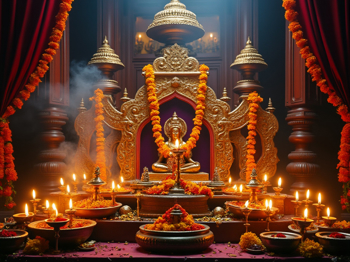



Poornima Vratam, observed on the full moon day of every lunar month, is a significant and auspicious day in Hindu culture. This vratam (fasting and ritual observance) is dedicated to the worship of Lord Vishnu or Lord Shiva, depending on regional traditions. The term "Poornima" refers to the full moon, symbolizing completeness and the divine feminine energy. Poornima Vratam is a day for devotees to seek spiritual growth, inner peace, and blessings from the divine. The rituals performed on this day are believed to purify the mind and body, helping individuals align with cosmic energies and lead a more balanced life.

The Poornima Vratam holds great spiritual significance for Hindus, symbolizing the triumph of light over darkness and knowledge over ignorance. The full moon is considered an embodiment of spiritual enlightenment, and observing vratam on this day is thought to enhance one's connection with the divine. It is believed that the rituals and prayers performed during Poornima Vratam invoke divine blessings, ensuring prosperity, happiness, and well-being. The vratam is also an opportunity for devotees to practice self-discipline, fostering spiritual growth and cultivating positive karma.
Spiritual Enlightenment: Observing Poornima Vratam helps in gaining spiritual insight and wisdom, aligning the devotee with higher consciousness.
Mental Peace and Clarity: Fasting and participating in the rituals of Poornima Vratam are believed to calm the mind, reduce stress, and promote mental clarity.
Divine Blessings: Devotees seek the blessings of deities, particularly Lord Vishnu or Lord Shiva, for prosperity, protection, and overall well-being.
Purification of the Mind and Body: The vratam involves fasting, which is considered a means to purify both body and soul, removing negative energies and fostering positive vibrations.
Positive Karma: Engaging in the rituals and charitable activities associated with Poornima Vratam helps in accumulating good karma, which is believed to influence future lives positively.
Enhanced Willpower and Discipline: The practice of fasting and observing the rituals requires self-discipline, which strengthens willpower and self-control.
Improvement in Relationships: The day is also considered auspicious for resolving conflicts and improving relationships, as the full moon energy promotes harmony and understanding.
Health Benefits: Fasting, when done correctly, can also have physical health benefits, such as detoxification of the body and improved digestion.
By observing Poornima Vratam with devotion and sincerity, devotees believe they can attain spiritual progress, physical well-being, and divine grace, leading to a more fulfilling life.
Performing Poornima Vratam involves a series of rituals and practices that are designed to purify the body, mind, and soul while seeking divine blessings. Here's a detailed guide on how to observe Poornima Vratam:
By following these steps with devotion and sincerity, you can successfully perform Poornima Vratam, inviting positive energies and divine blessings into your life.
Poornima Vratam (also known as Purnima Vrat or Pournami Vrat) is observed on the full moon day (Purnima) of each lunar month in the Hindu calendar. It is considered highly auspicious and is dedicated to Lord Vishnu or Goddess Lakshmi, depending on the specific tradition or month. The day is marked by fasting, prayers, and storytelling, often revolving around specific myths or legends related to the full moon.
One popular story associated with Poornima Vratam is about a devout couple named Supriya and Sudarshan, who were childless for many years. They were very pious and regularly observed fasts and performed rituals with deep devotion. However, their longing for a child remained unfulfilled, which caused them great distress.
One day, an old sage visited their home and noticed their sadness. The sage asked them about their troubles, and they shared their sorrow of not having a child. The sage, impressed by their devotion and piety, advised them to observe the Poornima Vratam, especially during the Sharad Purnima (the full moon day in the month of Ashwin).
The sage told them, "On the day of Poornima, observe a fast from sunrise to moonrise, and in the evening, after offering prayers to Lord Vishnu and the moon, break your fast. Listen to the Poornima Vratam Katha with full devotion and give alms to the needy. If you perform this Vratam with complete faith, your wish for a child will be fulfilled."
Following the sage's advice, Supriya and Sudarshan observed the Poornima Vratam with unwavering faith. They followed all the rituals, listened to the katha, and distributed food and clothes to the poor. Soon, by the grace of Lord Vishnu, they were blessed with a beautiful child.
From that day, Supriya and Sudarshan continued to observe the Poornima Vratam every month as a mark of gratitude. Their story spread far and wide, and many others began observing this Vratam with great devotion, leading to the fulfillment of their wishes.
The story of Supriya and Sudarshan highlights the importance of faith, devotion, and the power of fasting and rituals in Hindu traditions. Poornima is considered an auspicious day for worship and meditation, and it is believed that observing the Poornima Vratam brings peace, prosperity, and fulfillment of desires. The Vratam is also associated with the cleansing of sins and the attainment of spiritual purity.
Listening to or reciting the Poornima Vratam Katha during the fast is an integral part of the observance, as it reinforces the devotees' faith and commitment to the divine.
Each Poornima has its own significance depending on the month, such as Sharad Purnima, Guru Purnima, or Kartik Purnima, each with its own specific rituals and stories. Observing the Poornima Vratam during these times is considered especially meritorious.